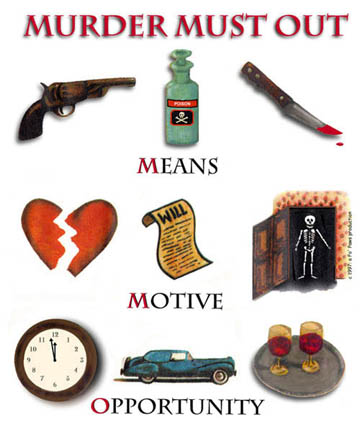The mystery story when done well is an extreme form of the story
problem, which one can enjoy both on the level of normal fiction
with characters and plot and setting and so on and on the level of
working out whodunnit before the author reveals the solution.
I'm not a strict follower of the
van Dine or
Knox rules
(particularly as some of them were pretty clearly written as direct
criticisms to certain books by Agatha Christie). I'm more inclined to
favour the Detection Club approach, a compressed version of the Knox
rules, summarised thus by Simon Brett:
that the author pledges himself to play the game with the public and
with his fellow-authors. His detectives must detect by their wits,
without the help of accident or coincidence; he must not invent
impossible death-rays and poisons to produce solutions which no
living person could expect; he must write as good English as he can.
He must preserve inviolable secrecy concerning his fellow-members'
forthcoming plots and titles, and he must give any assistance in his
power to members who need advice on technical points.
But in any case, as with rules of grammar and perspective I think the
artist is better off knowing what they are, and perhaps breaking them
deliberately, than breaking them by accident. Van Dine in particular
is very impatient with the rest of the book, seeing descriptive or
character-analysing passages as mere wrapping round the meat of the
puzzle; I'm more prone to try to enjoy the book both as a puzzle and
as a story. (Apart from anything else, this means I can read it again
later even if I remember the plot.)
It's unfortunate when one can solve the mystery by the shape of the
story: when a key question is raised but never answered and nobody
ever chases it up, or when the detective mulls over the credentials of
the five suspects while the reader remembers that there were six of
them. This wouldn't necessarily be a problem for a new reader, but one
does start to notice these patterns after a bit, and it's a shame when
writers fall into them.
The puzzle part of the story is traditionally regarded as a triad of
means, motive and opportunity:

(T-shirt design from Fo'Paws Productions.)
Means were early gimmicks: the ice dagger or bullet that melts in the
victim, the undetectable poison, and so on. This sort of thing has
mostly faded away now, along with opportunity gimmicks like the
traditional locked-room mysteries (which I think it's fair to say that
John Dickson Carr examined so exhaustively as to leave little space
for innovation), and those puzzles that involve detailed reading of
railway timetables. (I seem to remember at least one Agatha Christie
short story that hinges on the complete impossibility of a train
running five minutes late.)
What's left is motive, and that's where the puzzle overlaps with the
good story: of these people, all of whom physically could have
dunnit (and probably all of whom have some sort of reason), which is
the one who actually did? At that point all those
character-analytical passages come into their own, and if the people
are well-enough drawn that will give clues that can be blended with
conventional means and opportunity information to come up with the
result.
As Dorothy Sayers put into the mouth of Harriet Vane, constructing a
detective story in Strong Poison: "She is a person with a
monomania—no, no—not a homicidal one. That's dull, and not really fair
to the reader." I regard it as a failure mode of a mystery story to
say "a loony did it for his own reasons which don't make sense to a
rational observer". Yes, clearly murderers are not thinking quite like
normal people, or we'd be up to our ears in corpses. But removing both
character and motivation (because the loony has to appear something
like a reasonable person, so most of what you learn about their
motivations has been faked) removes for me the enjoyable part of the
puzzle, and throws one back on exactly who was where when.
Comments on this post are now closed. If you have particular grounds for adding a late comment, comment on a more recent post quoting the URL of this one.